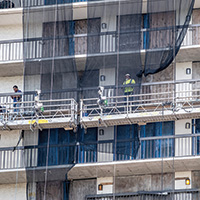 In wake of Surfside, condo costs here set to mount
In wake of Surfside, condo costs here set to mount
STORY BY PIETER VANBENNEKOM (Week of August 24, 2023)
Ever since the 12-story Champlain Towers condominium building in Surfside, Florida, collapsed just over two years ago in the middle of the night, killing 98 people, destroying the homes of many others and triggering a myriad of lawsuits, it’s only natural people have been asking: Could it happen here?
We’re about to find out, and whatever the answer, it’s likely to force local condo owners to dig a lot deeper into their pockets.
Although there is absolutely no reason to believe that any high-rise structure in our area is in imminent danger, a series of obligatory new inspections will determine just how safe any of our buildings of three stories or higher are.
Even that first step – plus the likely repairs that in many cases will follow – is costing a pretty penny and will result in hefty special assessments for condominium owners to pay for inspections and repairs, as well as sizable increases in annual maintenance fees to fully fund reserves and enable homeowners associations (HOAs) to carry out needed maintenance work in the future.
These new costs are coming on top of the recent sky-high increases in the prices of homeowners’ insurance of up to 300 percent or more, which all property owners in the area have been facing this year, and which are often passed on to condo owners by their HOAs in the form of additional assessments as well.
“We’re just getting hammered here,” said one condo resident after attending his recent HOA board meeting where the bad news was communicated to individual owners. “I know there’s not much we can do about it, but I proposed that we at least spread out the assessments as the work is being done so we don’t have to pay it all upfront. This is a real burden to some of us retired people living on a fixed income.”
In the wake of the Surfside calamity in South Florida, the Florida state legislature in May of last year passed a law requiring that all buildings of three stories and higher carry out structural inspections by qualified engineers. Some aspects of the law, such as who’s supposed to enforce it at the local level and how, are still unclear, and the Florida Bar Association is lobbying for further clarifications.
The town of Indian River Shores, for one, knows it will have to do its part. The town has identified the several buildings in its jurisdiction that fall under the law and is preparing letters to send out by certified mail, notifying them of the need for inspections – and who’s authorized to carry them out – and telling them that the town will collect them. Other jurisdictions are believed to be in various stages of the same process.
The deadline for completing those so-called “milestone inspections” is the end of this year for buildings located within three miles of the shoreline – or Dec. 31, 2024, for buildings farther west – so the crush has already started.
So far, few engineers in the area were qualified under strict new state regulations to carry out these inspections, and even though the legislation has been tweaked to open up inspections to more engineers and make it easier to become qualified, it is likely that some local buildings will have to search for state-approved engineers in larger nearby metro areas such as the Palm Beaches, Orlando or the Space Coast. They often charge higher fees.
Some buildings aren’t waiting until the deadline and have started inspections and repairs already, creating another crush. One contractor said it used to take a couple of weeks to process a construction permit with the appropriate municipal or county authorities, but it’s taking about double that time now.
One of the largest property management firms in the area, Elliott Merrill, refused any comment on how it is helping its clients comply with the new law. “We are not interested in participating in an article for any news outlet regarding the new condominium statutes,” said Community Association Manager Mike Gallagher. “It is a complex and still evolving matter.”
Elliott Merrill also manages the twin Village Spires condo buildings in central beach, the only high rises within the city limits of Vero Beach, which were extensively repaired and renovated after the 2004 hurricanes, However, the city of Vero Beach and its neighboring areas in Indian River and St. Lucie counties have many other buildings three stories high or taller.
Coldwell Banker Paradise, which also has a property management division, similarly failed to respond to several messages asking for details on how it was advising its HOA clients on complying with the law, saying any information provided would have to be approved by the company’s marketing department.
Any mention of Surfside, potential liabilities and lawsuits makes a lot of people in the real estate field rather skittish about talking openly about any possible problems.
The main focus of the inspections seems to be on outside balconies and terraces that are most exposed to the elements – the closer to the water they are and the older the building is, the greater the potential problem.
Among those buildings not waiting for the deadline to make inspections and repairs are several of the high-rises at the southern end of our island in St. Lucie County.
At the Sands of the Ocean building in the long chain of beachfront high-rises, extensive reconstruction work has been going on for three years now – since before the Surfside collapse. Individual owners in the 12-story building were reportedly assessed at least $40,000 each, more for larger units.
A Canadian winter snowbird renter who used to rent in the building said the constant jackhammering during the daytime made it virtually impossible to live there. “We had to play a lot of bridge that season just to get out of the house,” he said, adding that the landlord did finally provide some credit to make up for the noise factor.
In those cases where construction work has already started, engineers are making sure that their inspections will meet the criteria set out in the new Florida law, to prevent the inspections from having to be repeated.
Another typical case is a three-story condo complex on North A1A in Indian River Shores, which has just hired a contractor to undertake repairs on all terraces and balconies on a phased timetable that will extend over at least eight months stretching into the middle of next year. All of the 72 units need some repairs, with 82 percent of units needing repairs to their columns because of cracks.
The repairs, plus the cost of the engineering survey that preceded the selection of a contractor, resulted in a total special assessment of well over $200,000, or around $4,000 per unit depending on size. That was on top of the $3,700 special assessment to cover the additional cost of hurricane insurance on the building. And in addition, residents were told that their property manager will recommend a 25 percent increase in reserves to make sure, in accordance with the new state law, that reserves are fully funded by 2025 to cover any needed future repairs, which is sure to result in higher monthly maintenance fees for homeowners.
Again, the licensed engineering firm on the project promised to sign off on the fact that all repair work is being done in accordance with the new Florida state law. The engineering firm also guarantees that its own survey meets the legal requirements for the law’s “Stage 2 Milestone Inspections.”
Although the work to give everyone peace of mind – and preserve property values – will be expensive, the experts stress there is no need for panic over safety concerns.
“As far as we know, based on the preliminary steps taken, so far the engineers have not identified anything of a serious nature with structural integrity in our area,” says Will Lee, president of the Keystone Property Management Group, another major area firm active in the field. “I’ve seen nothing of the sort with my clients.
“If the inspections identify an immediate need, immediate repairs must be done,” Lee said. “If there is a need to replace other areas in the future, the HOAs will need to start saving and contributing to the reserves for future needs.”
Lee explained that in the past, individual condominium owners naturally tried to keep their maintenance dues as low as possible and only voted for enough reserves to cover the cost of repairing or replacing roofs, painting and maintaining pavements in common areas, but the new law imposes more stringent requirements and adds a whole list of items to be maintained relating to the structural integrity of the building. HOAs are just going to have to get used to needing to do more, Lee said.
“These formal inspections are just starting now as we get into the budgeting season,” Lee said. “The next few months will be busy.”



